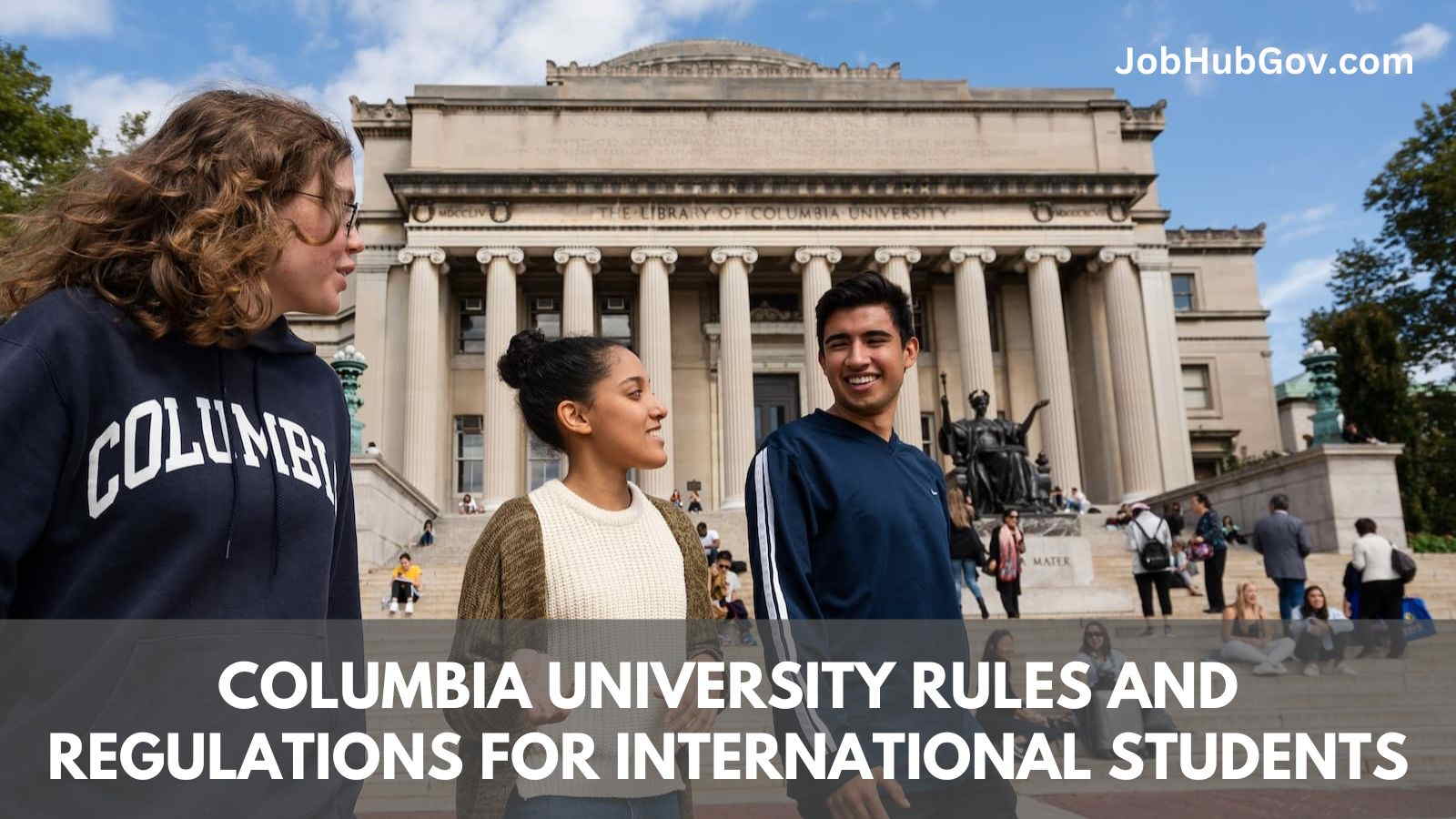Introduction
Columbia University, a prestigious Ivy League institution, attracts thousands of international students annually. However, adjusting to life in New York City involves more than academics—it requires understanding complex U.S. immigration rules, Columbia’s policies, and cultural nuances. This 2000-word guide demystifies Columbia University rules and regulations for international students, ensuring you stay compliant, avoid pitfalls, and thrive academically and socially.
Also Read: University of Chicago Booth School of Business MBA 2025: Requirements, Rankings, Fees, and
1. Visa and Immigration Compliance
F-1 Visa Requirements
International students typically enter the U.S. on an F-1 visa. Key obligations include:
- Full-Time Enrollment: Minimum 12 credits per semester (undergraduate) or 9 credits (graduate). Exceptions require approval from the International Students and Scholars Office (ISSO).
- Valid I-20: Keep your Certificate of Eligibility (Form I-20) updated—report major, funding, or program end date changes to ISSO within 10 days.
- SEVIS Compliance: The Student and Exchange Visitor Information System (SEVIS) tracks your status. Pay the SEVIS fee and ensure your record is active.
Maintaining Legal Status
Violating visa rules risks deportation. Avoid these common mistakes:
- Dropping below full-time credits without ISSO authorization.
- Working off-campus without proper authorization (CPT/OPT).
- Letting your I-20 expire. Apply for a program extension 30 days before the expiration date.
2. Academic Policies
Course Load and Grading
Columbia enforces strict academic standards:
- Full-Time Enrollment: Critical for visa compliance. Part-time status is only permitted during final terms or for medical reasons.
- GPA Requirements: Maintain a 3.0+ GPA for graduate programs; undergraduates risk probation if below 2.0.
- Academic Integrity: Plagiarism or cheating violates Columbia’s Code of Conduct, leading to suspension or expulsion.
3. Employment Rules for International Students
On-Campus Work
F-1 students can work up to 20 hours/week during semesters and full-time during breaks. Popular roles include research assistants, library staff, or campus ambassadors.
Curricular Practical Training (CPT)
- Eligibility: Requires enrollment for at least one academic year.
- Process: Secure a job offer related to your major, then apply via ISSO. CPT can be part-time (20hrs/week) or full-time (40hrs/week).
Optional Practical Training (OPT)
- Pre-Completion OPT: Work before graduation (rarely used).
- Post-Completion OPT: 12 months of work in your field post-graduation. STEM majors can extend by 24 months.
Also Read: Houston Maritime Attorney in the USA: Your Complete Guide to Legal Expertise and Claims
4. Health Insurance Mandate
Columbia requires all international students to enroll in the Columbia Student Health Insurance Plan (SHIP) or prove comparable coverage. Key features:
- Coverage for doctor visits, mental health, and emergencies.
- Waiver deadline: September 15 (fall) / February 15 (spring).
5. Housing Regulations
- On-Campus Housing: Guaranteed for first-years. Upperclassmen can apply but face competition.
- Off-Campus Tips: NYC housing is expensive. Use Columbia’s Off-Campus Housing Assistance (OCHA) for verified listings.
6. Code of Conduct and Community Standards
Respect Columbia’s policies on:
- Anti-Discrimination: Harassment based on race, gender, or nationality is prohibited.
- Alcohol and Drugs: Underage drinking or illegal substance use violates campus rules.
7. Essential Campus Resources
- ISSO: Your lifeline for visa advice, workshops, and cultural events.
- Writing Center: Free help with essays and research papers.
- Mental Health Services: Counseling and Psychological Services (CPS) offers confidential support.
8. Tax Obligations
- Form 1042-S: International students must file taxes annually, even with no income.
- Tax Treaties: Some countries exempt students from U.S. taxes—check with ISSO.
9. Travel and Re-Entry Tips
- Travel Signature: Obtain a valid I-20 signature from ISSO before traveling.
- Visas Expired? You can re-enter the U.S. with an expired visa if your I-20 and passport are valid (auto-revalidation).
10. COVID-19 Updates (2023)
- Vaccination Requirements: Columbia mandates up-to-date COVID-19 vaccinations.
- Hybrid Learning: Some programs offer flexible attendance; confirm with your department.
Also Read: How to Find a Specialized Mesothelioma Attorney: Key Details, Process
Frequently Asked Questions (FAQs)
Q: Can I switch from F-1 to another visa status?
A: Yes, but consult ISSO to avoid jeopardizing your student status.
Q: What if I fail a course?
A: Academic advisors can help you petition for grade changes or retakes.
Q: How long can I stay in the U.S. after graduation?
A: F-1 students have a 60-day grace period post-OPT/graduation to depart or change status.
Conclusion
Understanding Columbia University’s rules empowers you to focus on your goals without legal hiccups. Bookmark this guide, attend ISSO workshops and leverage campus resources to thrive as an international student.
By prioritizing compliance and engagement, you’ll make the most of your Columbia experience while avoiding common pitfalls. Welcome to New York City—and go Lions! 🦁🗽
